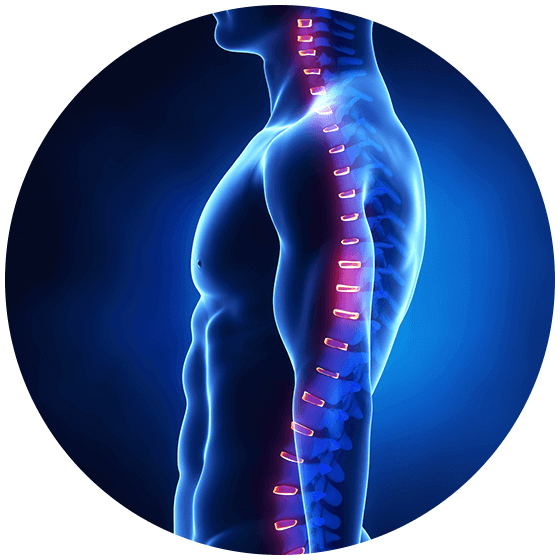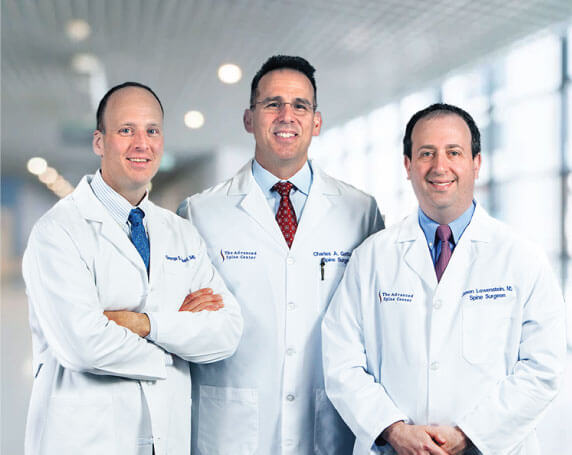Degenerative Disc Disease Treatment in New Jersey & New York
Get expert relief from degenerative disc disease with our nationally renowned, board-certified spine specialists. We offer advanced diagnostics and minimally invasive treatments for lasting back pain relief and improved mobility.

What is Degenerative Disc Disease?
Degenerative disc disease (DDD) is a common spine condition affecting millions of Americans, with symptoms appearing as early as age 30. As we age, the cushioned, shock absorbing discs in our spine can lose their elasticity and water content, leading to disc degeneration. This process can occur anywhere along the spine but most commonly affects the lower back (lumbar spine) and neck(cervical spine). When disc degeneration progresses, it can cause chronic back pain, neck pain, and reduced spinal mobility.
Degenerative disc disease can also contribute to related spinal conditions including herniated discs, spinal stenosis, and osteoarthritis, making early diagnosis and treatment crucial for maintaining your quality of life.
The degenerative disc disease specialists at the Advanced Spine Center in New Jersey and New York have extensive experience treating spinal disc degeneration, offering comprehensive spinal evaluations, precise diagnostic imaging, and personalized treatment plans ranging from conservative therapies to minimally invasive procedures. Request an appointment today or take the Patient Symptom Quiz below to get a head start on your disc care.
Degenerative Disc Disease Symptoms and Signs
Recognizing degenerative disc disease symptoms early is crucial for effective disc treatment and preventing progression of spinal disc degeneration. The symptoms of degenerative disc disease can vary significantly depending on the location and severity of disc deterioration. Common degenerative disc disease symptoms include:
- Back and Neck Pain: Chronic degenerative disc disease most commonly causes persistent lower back pain or neck pain that may worsen with sitting, bending, or twisting movements.
- Radiating Pain: Pain may radiate, or travel, from the affected disc area into the buttocks, legs, arms, or shoulders, as a result of lost disc height or pressure on nerves
- Numbness and Tingling: Spinal disc degeneration can compress nearby nerves, causing numbness, tingling, or weakness in the extremities.
- Muscle Spasms: Surrounding muscles may spasm as they attempt to stabilize the affected spinal segment.
- Stiffness and Reduced Mobility: Morning stiffness and decreased range of motion are common signs of disc degeneration.
- Pain Patterns: Symptoms often fluctuate, with periods of severe pain followed by relative relief.
When To See A Degenerative Disc Disease Specialist
If you’re experiencing persistent, painful degenerative disc disease symptoms, the spine specialists at The Advanced Spine Center in New Jersey and New York can provide accurate diagnosis and personalized disc degeneration treatment options.
Don’t let chronic degenerative disc disease symptoms stop you from living your best life. Contact our NJ spine specialists today to schedule your consultation.
Degenerative Disc Disease Pain Treatment Options
The Advanced Spine Center, with locations in New York and New Jersey, offers comprehensive degenerative disc disease pain treatment options, from conservative management to advanced minimally invasive techniques.
Artificial disc replacement is an advanced surgical treatment that replaces damaged spinal discs with artificial discs, preserving natural spine movement while relieving chronic degenerative disc disease pain.
When instability caused by a damaged disc results in skeletal inflammation and friction, a spinal fusion of the vertebrae may be required. This may be necessary in extreme cases when disc degeneration has led to a herniated disc or spondylolisthesis.
Epidural Steroid Injections
Degenerated discs can produce inflammation and pain that is incapacitating. Minimally invasive epidural steroid injections target the problematic disc and reduce inflammation through the injection of corticosteroids into the disc body.
Pain Management
For some, a degenerated disc may still be intact, but it causes considerable pain nonetheless. In these situations, a more conservative treatment regimen may be warranted. Over-the-counter medications, physical therapy, or chiropractic care may be prescribed.
What Causes Degenerative Disc Disease?
Understanding the causes of Degenerative Disc Disease and disc height loss can help you take proactive steps to protect your spinal health. Our New Jersey and New York degenerative disc disease specialists identify several key factors that contribute to spinal disc degeneration over time.
Primary causes of degenerative disc disease include natural aging, repetitive stress, injury/trauma, genetic predisposition, and lifestyle factors such as smoking, obesity, and lack of exercise contribute to reduced disc nutrition and health
Think you might have degenerative disc disease? Take our patient symptom quiz to assess your risk factors and learn about your treatment options, or request an appointment now!
What Our Patients Are Saying
Dr Lowenstein, Jamie and the staff at The Advanced Spine Center are a pleasure, period. During stressful situations, it is a relief to know that a highly competent/caring group of folks are available to assist as necessary with a smile and pleasant demeanor. I maintain 100% confidence in Dr. Lowenstein’s approach to reach a diagnosis, his skill set and bedside manner are above approach.
-Mitchell K. ⭐️⭐️⭐️⭐️⭐️
Best thing I ever [did] was to have my back operated on. Everybody at the Spine Center was great. Dr Lowenstein was my surgeon and did a great job on me. I would recommend to anybody who is having back problems to go and see them.
-Tony N. ⭐️⭐️⭐️⭐️⭐️
Dr. Lowenstein performed cervical surgery almost six months ago and I am thoroughly satisfied with the results. Most significantly I have the feeling and dexterity restored to my hands and fingers! I must also note that I am very impressed with the professionalism of the entire staff. They are both very caring and competent.
-Baptist C. ⭐️⭐️⭐️⭐️⭐️
Minimally Invasive Surgery for Degenerative Disc Disease
When conservative degenerative disc disease treatments are exhausted without sufficient improvement to your symptoms, our disc disease specialists can offer advanced minimally invasive disc treatment options. Our state-of-the-art minimally invasive surgical approaches deliver:
- Smaller Incisions – Reduced scarring and better cosmetic outcomes
- Faster Recovery – Shorter hospital stays and quicker return to activities
- Less Pain – Reduced post-operative discomfort and medication needs
- Better Outcomes – Excellent correction with preserved mobility
With extensive experience treating both mild and severe cases of degenerative disc disease, including complex spinal disc degeneration affecting multiple levels, The Advanced Spine Center has helped countless NY and NJ patients achieve lasting pain relief and return to active, pain-free living through personalized minimally invasive disc treatment plans.
Why Choose Us for Advanced Spine Care
The Advanced Spine Center in New Jersey is recognized as a leading destination for spine treatment in the nation. Patients choose us for their spine treatment because we offer:

Comprehensive Care
From initial evaluation to post-surgical care, we provide complete spine care. Our multidisciplinary team ensures optimal outcomes for every patient.

Advanced Technology
State-of-the-art imaging, surgical navigation systems, and minimally invasive instruments enable precise, safe spine care with excellent results.

Convenient Location
Easily accessible in New Jersey and New York , our modern facility provides comfortable care in a convenient location. Plus, patients from across the nation, and even world wide, find come to us!
Frequently Asked Questions About Degenerative Disc Disease
Despite its name, degenerative disc disease isn’t truly a disease per se, but a natural aging process where spinal discs lose water content and flexibility over time, creating disc height loss. However, degenerative disc disease symptoms can become chronic and require specialized disc degeneration care.
Early degenerative disc disease symptoms include persistent back or neck pain, stiffness, and discomfort that worsens with sitting or bending. If you’re experiencing these symptoms, our degenerative disc disease doctors in NJ and NY can provide accurate diagnosis.
While aging-related wear-and-tear on a spinal disc cannot be completely prevented, maintaining good posture, regular exercise, avoiding smoking, and proper lifting techniques can slow the progression of spinal disc degeneration.
If left untreated, sustained inflammation, loss of shock absorption and support, and loss of height between the vertebrae can lead to increasingly more severe conditions that may require surgery or could permanently compromise the structural integrity of the spine. Some of these possible conditions include bulging discs, herniated discs, bone spurs, facet joint pain, and spondylolisthesis.
Yes, conservative treatment options for degenerative disc disease include physical therapy, epidural injections, medications, and lifestyle modifications. Many patients achieve significant relief without surgery.
Minimally invasive surgery may be recommended when conservative, non-surgical treatments do not provide adequate pain relief or if severe nerve compression is present.
Ready to Take the Next Step in Your Spine Care?
Don’t let spinal disc pain hold you back. Reach out to top spine specialists in New Jersey and New York today!
